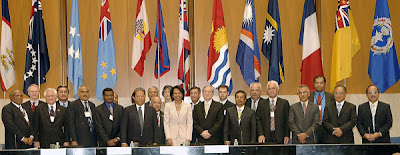Finally, let me welcome a few of America's Pacific Island leaders. Governor Linda Lingle is here. Linda, thank you so much for being here. I can remember visiting you in your great state. It's great to have you with us today. Governor Camacho from Guam, Lieutenant Governor Sunia from American Samoa, and Representative Tenorio representing the Commonwealth of the Northern Marianas. So thank you all.
The presence of all of these leaders from American -- from one American state and three U.S. territories illustrates the fact that the United States has a special kinship with our Pacific neighbors. We also have long-term ties with our friends in the Marshall Islands, Micronesia, and Palau.
There's another connection and one of great pride for us. A great many citizens from the Marshall Islands, Micronesia, and Palau volunteer and serve in the United States Armed Forces and many have given their lives in the defense of freedom. In this sacrifice, they join their fellow volunteers from Guam, American Samoa, and the Northern Marianas, Hawaii, and other states in protecting our shared freedoms. The United States is grateful for their service.
Our ties with the other independent countries of the South Pacific go back centuries to days when Nantucket whaling boats sought safe harbor in Fiji and Tonga and continuing through the island campaigns of World War II. As the countries of the Pacific became independent over the past four decades, we were proud to establish formal diplomatic relations and to join the world in welcoming each of your countries into the United Nations.
This meeting is a key event in what we are calling the year of the Pacific. You will hear this phrase many times this week, but it encapsulates our efforts to expand our engagement with your countries and to reaffirm America's historic role in the Pacific. Maintaining security and stability in the Pacific region is crucial to the interest of every country and every territory represented in this room, including the United States. Many of your countries face growing political, environmental, and economic challenges and these are often compounded by other more long-term transnational threats. They pose profound threats to the Pacific Islands.
In response to these challenges, we are working together to chart a comprehensive approach, promoting opportunity and prosperity, good governance and the rule of law, greater peace and security. You will hear more about our plans throughout the day. We also plan to highlight the potential economic benefits to the region that will result from the relocation of U.S. forces from Okinawa to Guam.
I stress this comprehensive approach for an important reason, because we all know and share the conviction that democracy plays a key role in fostering political and economic development. Like many of you, the United States is deeply concerned about the unlawful overthrow of the freely-elected government in Fiji. We are very pleased that Pacific countries have spoken with one voice through the Pacific Islands Forum in calling for the speedy return of democracy to Fiji. The Pacific cannot devolve into an area where strong men unilaterally decide the fates of their country and destabilize democratic foundations of their neighbors.
Let me close by thanking each of you for traveling to this important meeting. I hope that today’s events will give us an opportunity to broaden and deepen our friendships as we work together to build a brighter, more democratic, and more prosperous future for all of our citizens.
Thank you very much for joining us and I now have the honor of turning over the podium to President Note.
2007/377
Secretary Condoleezza Rice, Loy Henderson Conference Room, Washington, DC, May 7, 2007
Technorati Tags: State Department and Secretary of State or Pacific Island Conference of Leaders and Marshall Islands, or Micronesia and Palau or Condoleezza Rice, or Fiji and Tonga,, or Guam,












No comments:
Post a Comment